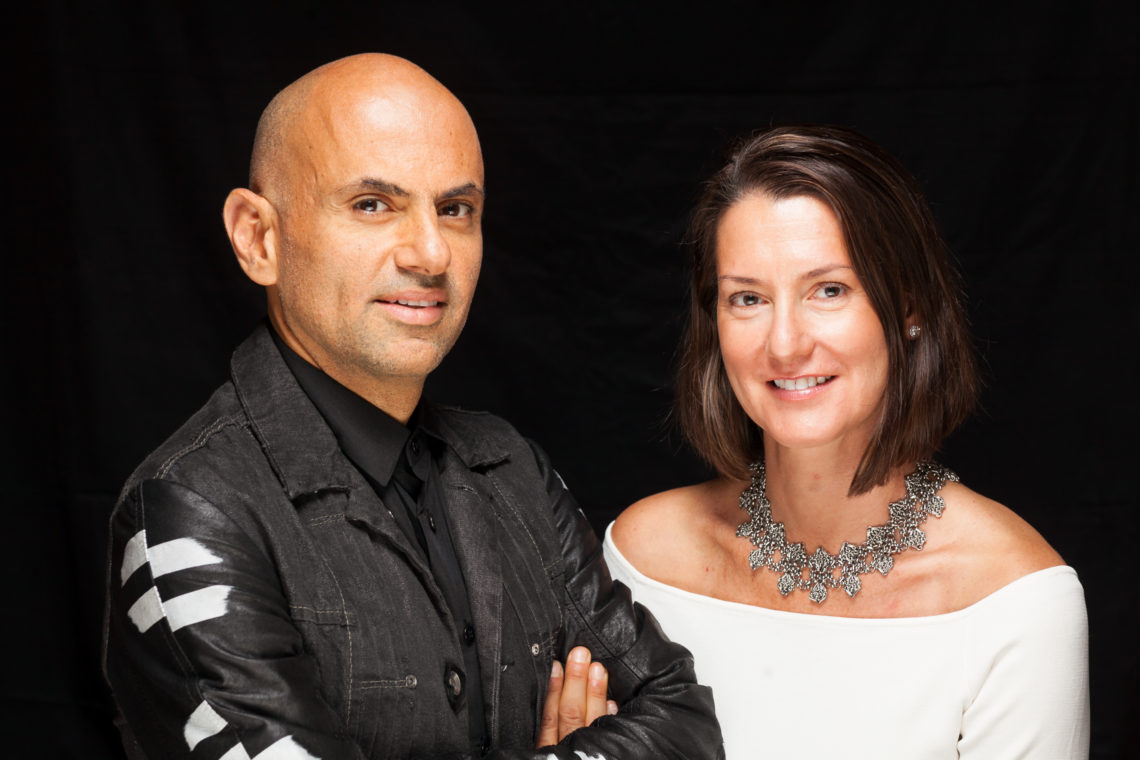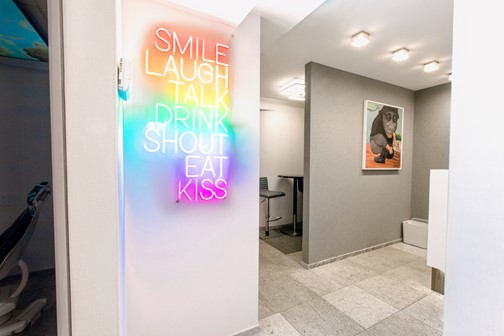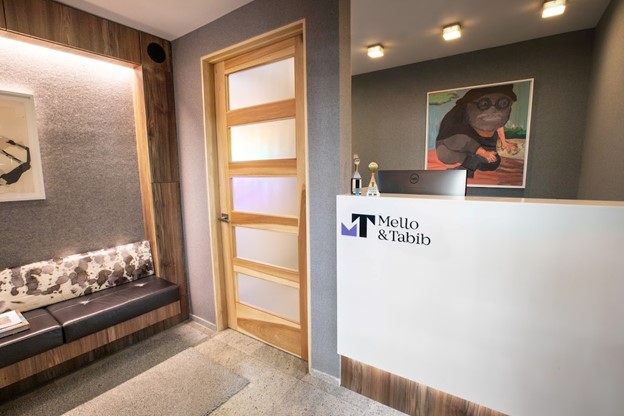
e-Newsletter
Vielen Dank,
wir haben Dir eine E-Mail an gesendet. Bitte bestätige diese.


“We’re determined to treat patients in a way that’s holistic and really addresses their needs.”
Ramin Tabib, DDS

“Some people buy a practice. We wanted to create something. It was what we felt resonated with us.”
Elisa Mello, DDS
A Partnership for Love, Life—and Dentistry
In 1994, Drs. Mello and Tabib started their practice together, based on a shared desire to do excellent dentistry and enhance patients’ lives. Here, they talk about how they got started and what keeps them inspired.
Growing up, neither Ramin Tabib, DDS, nor Elisa Mello, DDS, ever planned to become a dentist.
“For me, it was more of a chance,” admits Dr. Tabib. “I was taking some pre-med courses and I liked them, but I wasn’t really intent on anything. One of my friends in college said, ‘I’m going for an interview for dental school,’ and I asked him why he wanted to do it. And it influenced me. I said, ‘I’ll do it.’ It was just an instinct.”
“I always wanted to go into the medical field,” says Dr. Mello. “I was good at math and science and knew I wanted to help people. I also wanted to do something with my hands. So I thought dentistry was a great fit, especially for a woman—I could have a business and a family and get to create and do science all at the same time.”
And, so, the seeds of a dentistry—and life—partnership of almost 30 years and counting were planted.
Starting the Journey
With Dr. Mello at New York University College of Dentistry and Dr. Tabib at the Columbia University College of Dental Surgery, it wasn’t until their paths crossed at a job interview that their practice together could begin. “We both answered an ad in The New York Times,” recalls Dr. Tabib. “We had interviews the same day, so we were sitting in the waiting room together. And we both got hired and started on the same day.”
“It was a very big practice,” says Dr. Mello. “It was a great place to start. Because when you get out of residency or dental school, you may know how to do a Class II composite, but you need to develop speed and techniques that make the patient more comfortable. And this was a great place for us to learn.”
“All the patients wanted to see us because we really wanted to learn and hone our skills,” Dr. Tabib adds.
“We had the same work ethic,” agrees Dr. Mello. “We knew what we wanted to do. And, so, one thing led to another, and we decided to start our own practice.”

A Leap of Faith
The process wasn’t easy. “It was building from scratch completely,” says Dr. Tabib. To begin with, they both kept their full-time jobs, 9 to 5, Monday through Friday, while renting two chairs at another office on Saturdays. Then, they added evening appointments. “Of course, our first patients were family members, because it always turns out that way,” he laughs.
Slowly, they added more days to their new practice, and eventually they found a space of their own, and designed and outfitted it with the help of their dental company rep. Finally, they made the transition completely into their new office and left the old practice behind. “We struggled like everyone else at the beginning. It was about a year-and-a-half to two years of being there by ourselves before we hired an office manager,” recalls Dr. Tabib. “It was just one patient at a time, trying to get word of mouth and figuring out advertising.”
“Not a lot of people would do it this way,” admits Dr. Mello. “Some people buy a practice. We wanted to create something. It was what we felt resonated with us.”
“Our goal was always to deliver excellent care,” says Dr. Tabib. “It didn't matter how long it took. Our goal has always been to deliver the best dentistry we possibly can under the circumstances we have and the best technology we can afford.”
The Best Technology for the Patient
Today, their practice, NYC Smile Design, in New York City—the same space, albeit redesigned over the years—hosts an impressive array of that technology, from hard- and soft-tissue lasers to digital imaging and impression scanners and state-of-the-art sterilization systems. “When you’re committed to doing quality dentistry and maintaining a standard, you need to be on top of the latest technology,” says Dr. Mello.
“Company reps are always helpful with technology decisions,” she continues. “You may see something in a magazine, but if someone from the company comes in and shows it to you, you can get more information and know that it’s useful before spending $30,000 or more on it.”
“You use the technology that helps the patient, not that helps you with the marketing,” Dr. Tabib concurs. “Technology, to me, is just another tool. It’s not a way of advancing standing in the community. We’re determined to treat patients in a way that’s holistic and really addresses their needs. And addresses them in a way that we feel delivers the excellence of care and educates patients along the way.”

Treating More Than Teeth
Education and learning remain at the heart of their practice. “To this day, we both have a thirst for knowledge,” says Dr. Tabib. “I always feel like I never know anything, and the moment I don’t feel that way, I might as well retire, because if you feel like you know everything, then it all becomes routine. And the type of dentistry you do becomes a chore as opposed to wanting to do it better.”
“Professional development and continuing education are a way to keep your career really alive,” Dr. Mello continues. “You find the way you want to go, your niche. And you take a leap of faith, and you throw everything into it. And then that becomes what your practice is. It grows in that direction.”
“You have to be committed to what you believe in,” says Dr. Tabib. “You have to have a core philosophy of how you want to practice, even though you understand that there will be setbacks. But you know you will come back to it. As long as you feel in your heart that you are committed to something you truly believe in, then a setback shouldn't deter you. You just know you have to deal with it. And there will be setbacks. Nothing goes as smooth as you want it to. It's just growing pains.”
Both agree that the rewards of overcoming obstacles are worth the effort. “What I enjoy most is being able to give patients some hope,” Dr. Mello says. “Some patients have been through a lot of different dentists and they feel like they haven’t gotten answers. And we listen to them, and they feel listened to and know we care, and then we’re able to deliver. That’s the most satisfying thing for me, to be able to make a difference in their life.”
“When you become a dentist, you’re looking at teeth and you’re just treating teeth. But then something happens where a patient is really emotionally impacted by what you did. And you realize that you’re not working on teeth,” says Dr. Tabib. “You begin to realize that what is going on in their mouth and teeth and how they see themselves has a huge impact in their lives. You realize that you’re treating a human being, and you are treating their desires.”
Licensed to Learn
Even with the benefit of so much experience, Drs. Tabib and Mello are great believers in the value of keeping an open mind. “I think the more generalized experience you can do early on to see what you like and what you really want to commit to, the better,” says Dr. Mello. “For me, a general practice residency was great, because it made me realize I didn’t want to specialize.”
“When I came out of school, I truly believed I knew nothing,” adds Dr. Tabib. “And I felt like I almost wanted not to know anything. I want to be curious. When I got my degree, it just gave me the license to learn to be a good dentist.”
Dr. Mello has a final piece of advice for dentists who are just starting out on their learning journey. “Find the right partner,” she laughs.







